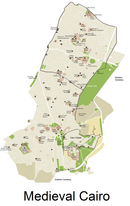Bayt al-Sinnari
| Bayt al-Sinnari | |
|---|---|
بيت السنارى | |
 Bayt al-Sinnari today, courtyard façade | |
 | |
| General information | |
| Type | Mansion |
| Architectural style | Ottoman style |
| Address | Monge passage |
| Town or city | Cairo |
| Country | Egypt |
| Completed | 1794 |
| Renovated | 2002 |
| Technical details | |
| Material | Stone and wood |
| Website | |
| Official website | |
Bayt al-Sinnari, built in 1794, is one of the remaining bourgeois mansions in medieval Cairo, Egypt. Managed by the Bibliotheca Alexandrina, the house has become an important cultural center after its restoration.
Location
[edit]Located in the neighborhood of the Al-Sayeda Zainab Mosque, Bayt Al Sinnari is reached through the dead-end Monge passage, named after Gaspard Monge,[1] who accompanied the French campaign to Egypt.
History
[edit]

Bayt Al Sinnari was built in 1794 by Ibrahim Katkhuda al-Sinnari, whose surname refers to the city of Sennar. In 1798, the house was confiscated by the French to house the members of the Committee of Sciences and Arts, that accompanied Napoleon Bonaparte to Egypt. Its mission was to conduct a systematic study of Egypt, published in the famous Description de l'Égypte.[2] Gaspard Monge, eponym of the passage, in which the house is located, was president, Napoleon Bonaparte deputy, and Joseph Fourier secretary. However, with the departure of the French expedition in 1801, the institute closed down.
From 1917 to 1933 Bayt Al Sinnari housed a private Napoleon museum. In the aftermath of the 1992 Cairo earthquake the house underwent an elaborate restoration process.[3] France, Egypt and the UNESCO cooperated in the salvage of the house.[4] Today, the house is an important cultural center.
Architecture
[edit]Bayt al-Sinnari is composed of two distinct sections: the ground-floor with all the reception areas on the western side. On the second floor the private apartments with a mashrabiyya of magnificent woodwork and a small hammam.[5] The house has an interior court centered by a marble fountain.[6]
References
[edit]- ^ Map of Bayt al-Sinnary Retrieved 2020-04-05.
- ^ History of Bayt Al Sinnari Retrieved 2020-04-05.
- ^ Official website of Bayt al-Sinnari Retrieved 2020-04-05.
- ^ UNESCO restoration of Bayt al-Sinnari Retrieved 2020-04-05.
- ^ Architecture of Bayt al-Sinnari Retrieved 2020-04-05.
- ^ Bernard Maury, Conserving and restoring the Harawi and al-Sinnari Houses in Cairo, Museum International (UNESCO Paris) 210:53, nº 2 (April–June 2001), pp 22-35.
Sources
[edit]

